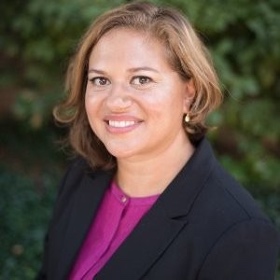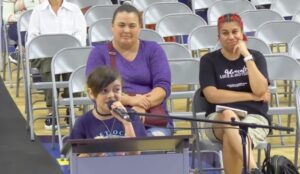by Natalie Hanson
posted Oct. 31
Chico Unified parents who demand that their school district crafts stronger protections for students and faculty against hate speech say they are forming an anti-racism coalition.

Mele Benz is one of numerous parents in Chico who say they want children to have better protection from discrimination and hate speech. She is one of three parents who head the board of what is now the NorCal Anti-Racism Coalition, which represents about 100 family members and allies. It asks that Chico Unified School District (CUSD) demonstrate no tolerance for hate speech or discrimination on its campuses. (See sidebar on increased bullying in California schools here.)
Benz once worked as an administrator at Chico Unified and saw its inner workings. She also has two elementary school-aged kids in the district, and has been attending annual Local Control Accountability Plan meetings for years. The meetings are required by the state for the purpose of hearing concerns and ideas from families, and to consider ways to improve equity in local schools.
Those meetings drove Benz and other parents to demand that the district take their concerns, particularly about existing discrimination and threats, to heart. Parents’ stories at the meetings indicated that “People were feeling unwelcome, students were feeling singled out,” she said.
“One Black student from Chico High talked about reading ‘Of Mice and Men’ and feeling really alone in that experience, reading about violence toward Black people with a teacher she didn’t connect with and who had been unwelcome toward her,” Benz said.
She said she also heard stories about students directing racial slurs at teachers, who reported that some campuses have administrators who are better prepared to handle such incidents than others. Another parent told her that his child faces bullying at school and feels that administrators aren’t assisting the child. Benz said the district’s policy and training should be so clear that administrators should know exactly how to handle such situations.
“Families shouldn’t have to hold their children back from schools because the administrators are figuring it out and they don’t feel safe there,” Benz said. “Parents shouldn’t be wondering, ‘Do I have to take my kids to another school because they’re not keeping my child safe?’” she said.
Those revelations are why she and other parents are asking for a more unified response through revising the district’s anti-hate policy. Benz noted the controversies that exploded last year over the suspension of Joana Campos at Rosedale Elementary, when some parents demanded more multiculturalism and other parents protested the push for diversity education in schools.
She also noted the anti-LGBTQ sentiments expressed at school board meetings in Chico and nationwide. At the Oct. 4 CUSD board meeting, a grandparent, Loretta Torres, in explaining her view that the district should not maintain its policy that prevents school personnel from outing students, used the words “sexually dysphoric” and referred to a “transgender craze.”
These parents are repeating microaggressions or hate speech against LGBTQ children — which also should be addressed under a stronger anti-discrimination policy, Benz said.
“Civil rights protections are fundamental rights on the books in our law, in our board policies, as they stand and they are being ignored,” Benz said. “I perceive that people think there are two sides to this argument, and both sides are equally valid, and to that I say no. Harm is happening to our kids of color, and that relates to their civil rights — their right to education, to be in school. It feels as though a blind eye is being turned.”
Another Chico parent, Dominique Silva Soares, who is Chico State Educational Opportunity Program advisor, said some parents who grew up in the district are watching their children suffer the same experiences they did, from microaggressions to blatant hate speech.

She said her Black sons have heard racist insults from people in Chico since before they entered school, and she removed one son from an elementary school due to what she called “racist behavior” from a teacher and tension in the classroom around teaching Black history.
“No one has done anything to change the racist culture that exists in Chico Unified at all,” Soares said.
“It’s so easy for schools to put up signs like ‘no bullying’ and ‘no sexual harassment,’ but nobody ever calls out racism. Nobody ever puts up a sign saying ‘We have zero tolerance of racism.’ Everyone is scared to do that. Why is everybody afraid of this word?”
Soares said that the hesitancy to call hate speech what it is leaves children of color unsafe on campuses and affects their education. Black and Latino students have lower math and reading scores and are suspended more often than White students, according to the district’s periodic data reports.
“I think they’re afraid of the pushback,” she said. “They’re trying to walk a fine line to appease the people of color and racists. I think it’s another tactic of checking the box.”
The founders of the coalition took the stories they had been hearing from parents like Soares and crafted a “dream statement” for the district, outlining what they hoped to see in five years if the district made changes to ensure that families and students of color could thrive. This includes strengthening existing policies designed to prevent discrimination.
“What we’re specifically asking for is for the board to, in the policy, articulate the varying levels of hate-motivated behavior from micro-aggression to hate crime and everything that comes in between,” Benz said. “And, to clarify for staff and faculty for how they respond, with evidence-based preventative measures, using the examples of other school districts which have revamped their hate prevention policies or created new ones.”
One of the coalition’s goals is to hear from more students, and either uplift them or speak on their behalf.
“We know the district isn’t doing enough of that yet, and we see ourselves as both collaborators with the district, and watchdogs as well,” Benz said.
The coalition’s letter of recommendations went to Chico Unified’s school board members and Superintendent Kelly Staley. It states, among other things, that, “In reviewing Districts’ policies throughout the state, we see inclusion of evidence-based prevention strategies such as restorative practices and anti-bias training.”
Benz said that district leaders arranged a meeting between the parents, administrators and board President Caitlyn Dalby and Vice President Elieen Robinson to discuss the recommendations. Benz said she did not hear administrators at that meeting commit to making any tangible changes.
“We feel like we keep hearing the same kinds of responses,” Benz said. “There’s some avoidance, some excuses. We’ll hear, ‘We do great work and you guys just don’t know what we’re doing.’”
Staley’s communications officer Erica Smith said the district is working on equitable community engagement between teachers, administrators and families.
“Collaboration is happening at all levels of the school district, and we are excited to see the communication exchange and input leading to positive shifts within our district,” Smith told ChicoSol in an email. “While we are making great strides, there is more work to be done and we sincerely value our student, parent and community input.”
Chico Unified school board member Tom Lando told ChicoSol that he thinks the coalition’s recommendations are important, but are already addressed by the existing non-discrimination policy. The existing policy is brief and generally defines discrimination, but does not suggest specific consequences for hate speech or discrimination.
“We can always do better in training our staff to support students of all needs and from all backgrounds, though by and large they do a fantastic job,” he told ChicoSol. “If there are specific cases in which our current policy and practices aren’t supporting students, I hope that anyone would bring that to the attention of the board.”
The letter of recommendations has not yet been scheduled for a school board meeting agenda as no school board member has moved to request that discussion. The school board listened without response to parents during public comment at the Oct. 18 meeting. Several parents said they want to see a clear commitment to preventing racism and discrimination and to protect children of color.
Chico State instructor Christine Leistner accused the district of having a policy of waiting to respond to bullying until a bullying victim lashes back at the perpetrators, and then punishing the victim.
“We need a zero-tolerance policy for hate speech,” Leistner said. “Any child on any campus who uses racial hate speech should be suspended. I don’t care if their family is a good family or a decent family, it’s embarrassing that the smaller districts with fewer resources can handle this better than we can.”

Student Ida P., a fourth-grader at Rosedale Elementary, said that she hears kids make fun of Japanese features and language and repeat racial slurs. She said that she has never heard faculty discuss anti-racism, and wants to see it defined and provided.
“Many kids don’t know what racism is, and don’t know the impact their words have on their classmates,” she said. “I want schools to be a safe place for everyone, especially the BIPOC students who seem to be the butt of these jokes. I know I’m just a kid, but I hope you prioritize this and put it on your next agenda.”
Natalie Hanson is a contributing writer to ChicoSol.

This is so needed. Thank you for your interest in a mentally healthy community.
BCAC is leading the way to the much needed work in our Butte schools to define and implement antiracist and antibias policies in a systemic way. Hate speech and hate motivated behavior are clearly harmful and degrade not only individuals – also the school climate. A clear policy and response to these incidents create opportunities for the learning and implementation of restorative practices- powerful components of a social emotional education.
There is no needed work in this. Keep it out of the classroom. Blatantly simple.